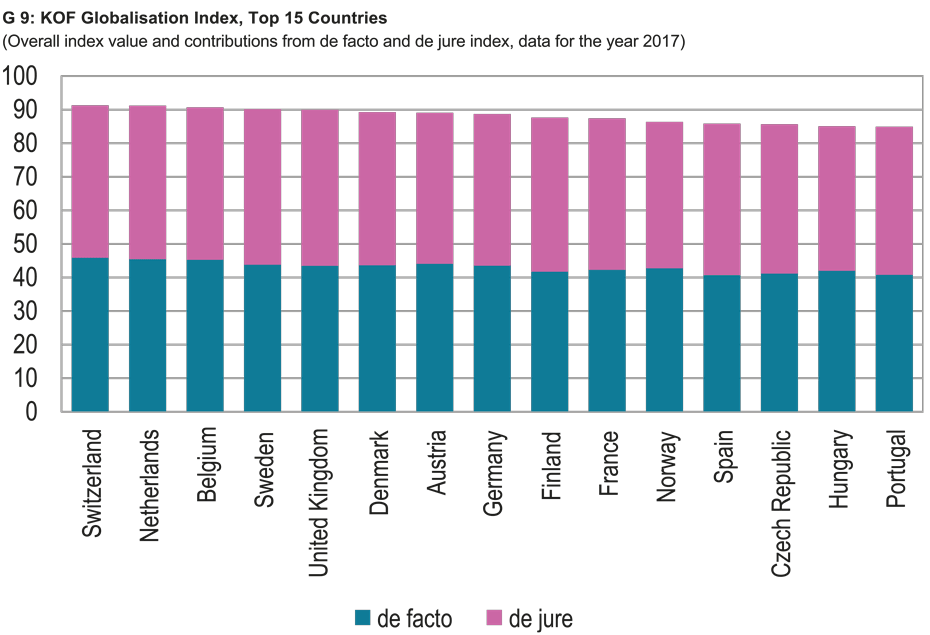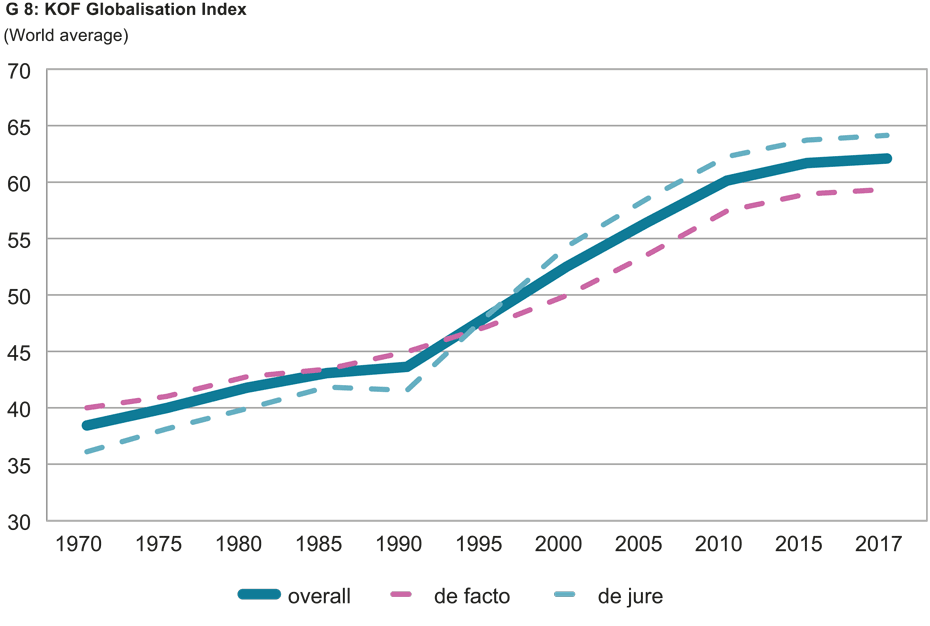World trade weak, globalisation flagging
- KOF Index of Globalization
- KOF Bulletin
Economic and social globalisation is in the doldrums, whilst political globalisation is forging ahead: so say the results of the latest KOF Globalisation Index. Switzerland remains the most globalised country in the world, followed by the Netherlands and Belgium.

Globalisation levels worldwide increased sharply between the 1990s and 2007. However, the financial crisis and the Great Recession that followed in its wake slowed down this trend. The level of globalisation worldwide only rose slightly also in 2017, the most recent year covered by the KOF Globalisation Index. Protectionist tendencies in various parts of the world are expected to subdue the trend towards globalisation (See G 8).
Financial flows increasing, although trade remains weak
Since the 2007 financial crisis economic globalisation has made hardly any progress. However, a distinction must be drawn between financial globalisation and trade integration. Whilst international financial flows (de facto financial globalisation) have been on the increase again for several years despite identical framework conditions (de jure financial globalisation), some weaknesses are apparent on the trade front.
International trade integration (de facto trade globalisation) has fallen since 2014 and current trends point towards a further contraction in world trade. Although the framework conditions for trade have improved since 2014, the current trade disputes between the USA and China and between the USA and the European Union are not yet reflected in the current index. The first tariff hikes by the USA were imposed at the start of 2018 with the introduction of increased tariffs on washing machines and solar panels from China, followed by tariff rises on steel and aluminium products from various countries around the middle of the year.
There has been barely any progress also in social globalisation for several years. Whilst the intensity of personal contacts (measured for instance by tourist figures or migration) has been stagnating, information flows (measured for instance in terms of patent applications or high-technology trade) are on the increase. At the same time, a slight downward trend is apparent for cultural globalisation. In the meantime, the degree of political globalisation is increasing again, according to the current index.
Switzerland, in the vanguard of globalisation
In 2017 Switzerland was once again the most globalised country in the world, followed by the Netherlands and Belgium (see G 9). Switzerland is highly globalised across all categories (economic, social and political). First of all, the country has a high ratio of foreign trade to GDP and is highly interlinked with other counties also in the financial sector, thanks to its banking centre as well as the fact that it hosts a large number of international holding companies. Secondly, its geographical location, cultural diversity and high income levels result in a high level of integration on a social level. Finally, it may be assumed that the many international organisations headquartered in Switzerland have a positive effect on the country’s globalisation.

Large economies are often less globalised
Due to their greater interconnectedness, for instance with neighbouring countries, smaller countries tend to be more globalised than larger countries. A large chunk of trade within large countries is conducted inside the country. As a result, the major global economies tend to be found within the mid-range of the Globalisation Index.
The USA is ranked in 59th place for economic globalisation, and 27th and 14th for social and political globalisation respectively. The People’s Republic of China is in the lowest third for the overall index in 80th place. Whilst China is ranked 26th for political globalisation, its degree of economic and social globalisation is significantly lower. Japan, the third largest economy in the world, is ranked 37th. Major EU economies such as Germany, the United Kingdom, France and Spain are much more globalised overall thanks to their high level of economic, social and political integration within the EU.
Methodology
The current KOF Globalisation Index is available for 195 countries and covers the period between 1970 and 2017. A distinction is drawn within the index as a whole between de facto and de jure globalisation, as well as between the economic, social and political aspects of globalisation. The index measures globalisation on a scale from 1 to 100. Figures for the underlying variables are sub-divided into percentages. 42 different variables are used, which are aggregated according to a statistical weighting procedure (principal component analysis).
For further information concerning methodology, see here
Contact
No database information available
